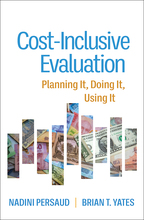Cost-Inclusive Evaluation
Planning It, Doing It, Using It
Nadini Persaud and Brian T. Yates
Foreword by Michael Scriven
“The book’s presentation of actionable procedures and processes makes it a useful resource for practitioners and students alike….Instructors could use the content to encourage students to think about the roles for cost analysis as a part of larger analytical goals and could design a hypothetical cost analysis using the various methodological options presented throughout….This approachable cost evaluation reference complements existing texts on cost analysis in social sciences by offering novel perspectives and methods. One of this books’ greatest strengths is its ability to define the key terms and concepts of cost analysis in understandable yet thorough ways. It covers the basics and introduces the reader to more complex situations and applications. Further, the authors manage the difficult task of keeping the topics interesting with useful examples and anecdotes….Cost-Inclusive Evaluation both communicates the value of cost analysis and provides concrete guidelines on how to incorporate cost analysis in evaluation. It has great potential to serve as a reference guide for experienced evaluators and as a textbook for evaluation students.”
—American Journal of Evaluation
“In a time of heightened focus on results-driven managerial accountability, this book delves into program costs through a genuinely evaluative lens, strengthening evaluators' understanding of program outcomes and impacts. It takes examination of costs outside the exclusive domain of economists and accountants and explores cost types and dynamics that are seldom considered in decision making. In seemingly effortless prose, the authors provide a straightforward, user-friendly guide for novice to seasoned evaluators. The book elucidates the logic of cost-benefit and cost-effectiveness analysis tools—and, most important, their usefulness in real-world evaluation endeavors.”
—Mita Marra, PhD, Department of Social Sciences, University of Naples Federico II, Italy; Editor-in-Chief, Evaluation and Program Planning
“This is a great book for a graduate evaluation topics course or for practitioners who want to expand their capabilities. Easy to follow, the book takes the reader through the process of cost-inclusive evaluation step by step, as well as discusses the pitfalls.”
—Kimberly A. Fredericks, PhD, Dean, School of Management, Russell Sage College
“This welcome contribution to the field sheds much-needed light on the importance of measuring a wide range of costs when undertaking evaluations. It presents useful tools that are grounded in key technical processes. Of special note, the authors do a wonderful job in presenting the information in an accessible manner that is anchored in multiple perspectives and in the complex social contexts in which programs operate. The authors’ honest account of the reality that evaluators face is refreshing. By avoiding a strict financialization approach, the book strikes a careful balance between the technical and the human-centered, which helps us move into a more nuanced understanding and practice of cost analysis in evaluation.”
—Ruby Dagher, PhD, School of International Development and Global Studies, University of Ottawa, Canada
Table of Contents
Foreword, Michael ScrivenI. The Why, the Types, and the Tools of Cost-Inclusive Evaluation
1. Cost-Inclusive Evaluation
2. Types of Costs and Outcomes That Need to Be Considered in Cost-Inclusive Evaluations
3. Tools for Identifying and Measuring Costs and Outcomes and Other Issues for Consideration 
II. Adapting Economic Methods to Enhance Cost-Inclusive Evaluation
4. Economic Appraisal Methodologies
5. Considerations When Using Economic Appraisal Methods
III. Adapting Concepts and Tools from Accounting to Improve Cost-Inclusive Evaluation
6. Financial Accounting Concepts and Tools
7. Cost and Management Accounting Concepts and Tools
IV. Cost-Inclusive Evaluation for the Scientist-Manager-Practitioner
8. Breaking Down Cost by Activity for Better Cost-Inclusive Evaluations
9. Completing the Model with Activity -> Process and Process -> Outcome Analyses
List of Acronyms
Glossary
References
Author Index
Subject Index
About the Authors
About the Authors
Nadini Persaud, PhD, CPA, CGA, is a tenured Lecturer in Evaluation in the Department of Management Studies at the University of the West Indies, Cave Hill Campus, Barbados. She teaches primarily at the graduate level and has served as Coordinator of the Master of Science Program in Project Management and Evaluation. The recipient of a Fulbright scholarship, Dr. Persaud is an Advisory Council member for the Barbados Chapter of Chartered Professional Accountants Canada and a board member of Caribbean Evaluators International and the Faster Forward Fund. She also serves on several committees of the American Evaluation Association. Her research focuses on blending the tools of project management and accounting to improve the practice of professional evaluation. Dr. Persaud has published numerous journal articles and book chapters, as well as several books, and has presented over 20 conference papers on the importance of cost analysis in program evaluation.Brian T. Yates, PhD, is Professor in the Department of Psychology at American University in Washington, DC. Working with colleagues in his Program Evaluation Research Lab (PERL) and other universities, Dr. Yates has applied his resources–activities–processes–outcomes analysis (RAPOA) model to measure and improve costs, cost-effectiveness, cost-benefit, and cost-utility of diverse health and human services and their accreditation processes. He has 100 publications, including many peer-reviewed articles, book chapters, a National Institute on Drug Abuse manual on cost-inclusive evaluation, and six books. At American University, Dr. Yates developed the Master's Program in General Psychology and served as Acting Chair of the Department of Psychology and as Associate Dean of Graduate Studies in the College of Arts and Sciences. He has served as board member and Treasurer of the American Evaluation Association.
